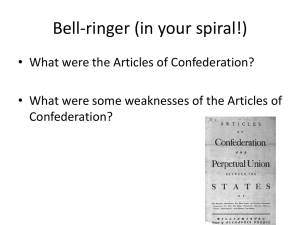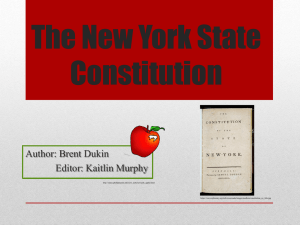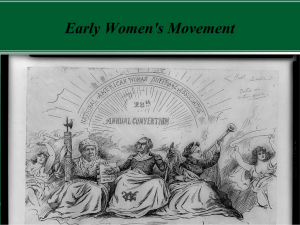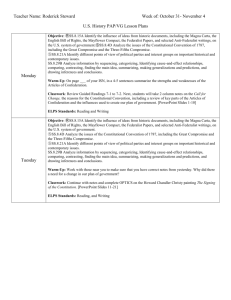See a map of the states who have signed on and an
advertisement
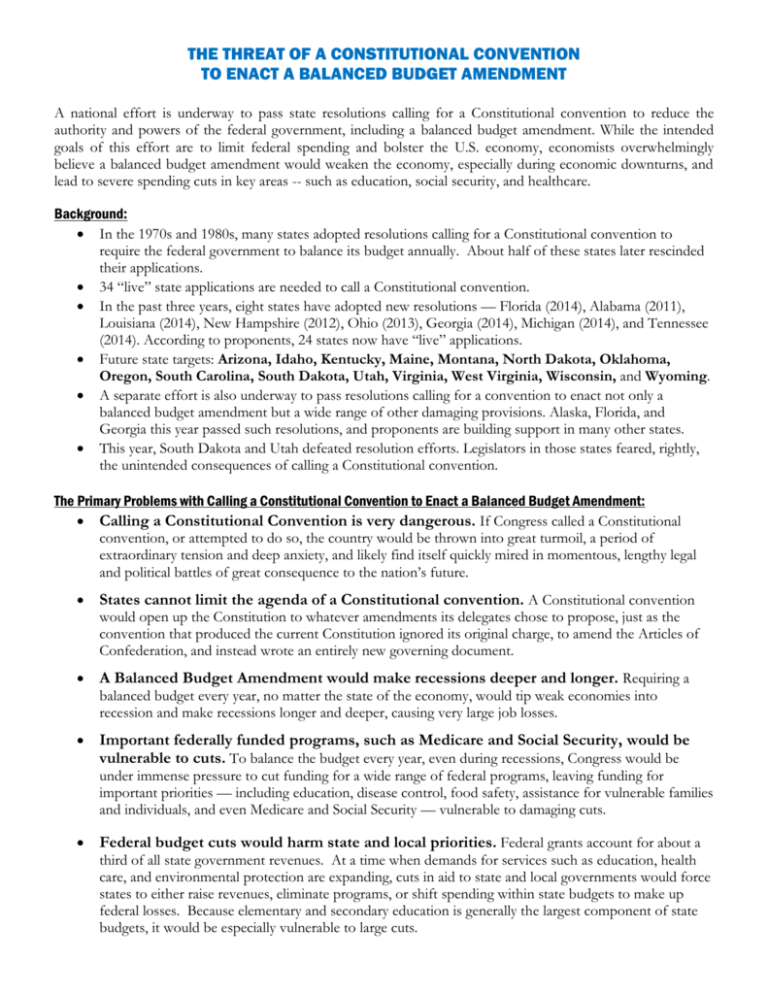
THE THREAT OF A CONSTITUTIONAL CONVENTION TO ENACT A BALANCED BUDGET AMENDMENT A national effort is underway to pass state resolutions calling for a Constitutional convention to reduce the authority and powers of the federal government, including a balanced budget amendment. While the intended goals of this effort are to limit federal spending and bolster the U.S. economy, economists overwhelmingly believe a balanced budget amendment would weaken the economy, especially during economic downturns, and lead to severe spending cuts in key areas -- such as education, social security, and healthcare. Background: In the 1970s and 1980s, many states adopted resolutions calling for a Constitutional convention to require the federal government to balance its budget annually. About half of these states later rescinded their applications. 34 “live” state applications are needed to call a Constitutional convention. In the past three years, eight states have adopted new resolutions — Florida (2014), Alabama (2011), Louisiana (2014), New Hampshire (2012), Ohio (2013), Georgia (2014), Michigan (2014), and Tennessee (2014). According to proponents, 24 states now have “live” applications. Future state targets: Arizona, Idaho, Kentucky, Maine, Montana, North Dakota, Oklahoma, Oregon, South Carolina, South Dakota, Utah, Virginia, West Virginia, Wisconsin, and Wyoming. A separate effort is also underway to pass resolutions calling for a convention to enact not only a balanced budget amendment but a wide range of other damaging provisions. Alaska, Florida, and Georgia this year passed such resolutions, and proponents are building support in many other states. This year, South Dakota and Utah defeated resolution efforts. Legislators in those states feared, rightly, the unintended consequences of calling a Constitutional convention. The Primary Problems with Calling a Constitutional Convention to Enact a Balanced Budget Amendment: Calling a Constitutional Convention is very dangerous. If Congress called a Constitutional convention, or attempted to do so, the country would be thrown into great turmoil, a period of extraordinary tension and deep anxiety, and likely find itself quickly mired in momentous, lengthy legal and political battles of great consequence to the nation’s future. States cannot limit the agenda of a Constitutional convention. A Constitutional convention would open up the Constitution to whatever amendments its delegates chose to propose, just as the convention that produced the current Constitution ignored its original charge, to amend the Articles of Confederation, and instead wrote an entirely new governing document. A Balanced Budget Amendment would make recessions deeper and longer. Requiring a balanced budget every year, no matter the state of the economy, would tip weak economies into recession and make recessions longer and deeper, causing very large job losses. Important federally funded programs, such as Medicare and Social Security, would be vulnerable to cuts. To balance the budget every year, even during recessions, Congress would be under immense pressure to cut funding for a wide range of federal programs, leaving funding for important priorities — including education, disease control, food safety, assistance for vulnerable families and individuals, and even Medicare and Social Security — vulnerable to damaging cuts. Federal budget cuts would harm state and local priorities. Federal grants account for about a third of all state government revenues. At a time when demands for services such as education, health care, and environmental protection are expanding, cuts in aid to state and local governments would force states to either raise revenues, eliminate programs, or shift spending within state budgets to make up federal losses. Because elementary and secondary education is generally the largest component of state budgets, it would be especially vulnerable to large cuts.
